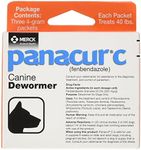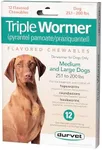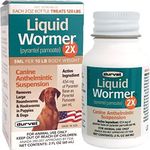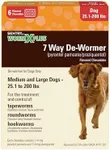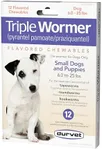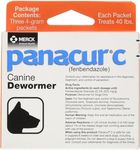Buying Guide for the Best Dog Deworming Treatments
Choosing the right dog deworming treatment is crucial for maintaining your pet's health and well-being. Worm infestations can lead to serious health issues, so it's important to select a treatment that is effective and safe for your dog. When picking a deworming treatment, consider the type of worms, the form of the medication, the frequency of administration, and your dog's specific needs. Here are some key specifications to help you make an informed decision.Type of WormsDifferent deworming treatments target different types of worms, such as roundworms, tapeworms, hookworms, and whipworms. It's important to know which type of worm your dog is infected with, as this will determine the appropriate treatment. If you're unsure, consult your veterinarian for a diagnosis. Some treatments are broad-spectrum and can target multiple types of worms, which can be a good option if you want comprehensive coverage.
Form of MedicationDeworming treatments come in various forms, including tablets, chewables, liquids, and topical applications. Tablets and chewables are often flavored to make them more palatable for dogs, while liquids can be mixed with food. Topical treatments are applied directly to the skin and can be a good option for dogs that are difficult to medicate orally. Choose a form that is easiest for you to administer and that your dog will accept without too much fuss.
Frequency of AdministrationSome deworming treatments require a single dose, while others need to be administered over several days or repeated at regular intervals. Consider your schedule and your dog's tolerance for medication when choosing a treatment. Single-dose treatments can be more convenient, but multi-dose treatments may be necessary for severe infestations or specific types of worms. Follow the instructions carefully to ensure the treatment is effective.
Age and Weight of DogThe age and weight of your dog are important factors in selecting the right deworming treatment. Puppies, adult dogs, and senior dogs may require different formulations or dosages. Always check the product label for age and weight recommendations to ensure the treatment is safe and effective for your dog. If you have a puppy or a very small dog, look for treatments specifically designed for their size.
Safety and Side EffectsSafety is paramount when choosing a deworming treatment. Some medications can cause side effects such as vomiting, diarrhea, or lethargy. Research the potential side effects of any treatment you are considering and consult your veterinarian if you have concerns. It's also important to check if the treatment is safe to use in conjunction with other medications your dog may be taking.
Veterinarian RecommendationConsulting your veterinarian is always a good idea when choosing a deworming treatment. They can provide a diagnosis, recommend the most effective treatment, and advise you on the proper dosage and administration. Your vet can also monitor your dog's progress and make adjustments to the treatment plan if necessary. Trusting professional advice can give you peace of mind and ensure your dog's health is in good hands.




